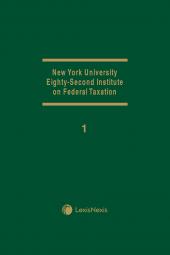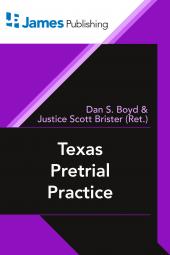Texas Pretrial Practice
Select a format
 International Order Inquiry
International Order Inquiry
Select subscription type
Terms & conditions
Subscribers receive the product(s) listed on the Order Form and any Updates made available during the annual subscription period. Shipping and handling fees are not included in the annual price.
Subscribers are advised of the number of Updates that were made to the particular publication the prior year. The number of Updates may vary due to developments in the law and other publishing issues, but subscribers may use this as a rough estimate of future shipments. Subscribers may call Customer Support at 800-833-9844 for additional information.
Subscribers may cancel this subscription by: calling Customer Support at 800-833-9844; emailing customer.support@lexisnexis.com; or returning the invoice marked "CANCEL".
If subscribers cancel within 30 days after the product is ordered or received and return the product at their expense, then they will receive a full credit of the price for the annual subscription.
If subscribers cancel between 31 and 60 days after the invoice date and return the product at their expense, then they will receive a 5/6th credit of the price for the annual subscription. No credit will be given for cancellations more than 60 days after the invoice date. To receive any credit, subscriber must return all product(s) shipped during the year at their expense within the applicable cancellation period listed above.
The total price includes the product(s) listed in the Order Form and any Updates for a limited period (minimum period of 30 days) after the order is placed ("Order Window"). Shipping and handling fees are not included in the grand total price.
All shipments may be returned, at subscribers' expense, for full credit of the Price within 30 days of receipt.
Shipments may not be returned, and no credits will be issued, more than 30 days after receipt.
After the Order Window, subscribers will receive notice of Updates along with the then-current grand total price and order process as Updates become available. Subscribers will only be shipped those Updates they specifically request.
Product description
Texas Pretrial Practice
A step-by-step outline format and proven practice tips help you avoid pitfalls. Procedure and law outlines in the publication are supported by 2,700 case citations summarized in plain English.
Texas Pretrial: Step by Step
When civil procedure challenges arise, sage advice can make a big difference in your hours, stress, and results. Texas Pretrial Practice probes every step of civil procedure before trial. This problem-solving manual covers each portion of pretrial procedure and focuses on the issues that arise in pleading, motions, and discovery.
Chief Justice Scott Brister of the 14th Court of Appeals and veteran Dallas trial lawyer Dan Boyd have set a new standard of excellence for Texas legal resources with thorough coverage of:
• Jurisdiction & venue
• Pleadings
• Citation & service of process
• Special exceptions
• Defaults
• TROs & injunctions
• Privileges
• Motion practice
• Discovery disputes
• Depositions
• Requests for admission
• Inspection of documents
• Interrogatories
• Physical & mental exams
• Settlement & ADR
• Summary judgment
Outline format and tight writing. The frequent headings, short paragraphs, plain English, and clear writing speed your access and understanding. Chapter tabs and a detailed index make searching quick and easy.
Proven practice tips. Advantages and disadvantages, cautions, caveats, examples, tactics, tips, and more keep you clear of pitfalls and help you plot strategy.
Recent cases. Legal principles are supported with current, summarized cases rather than lengthy string citations with no differentiation.
Direct answers to tough discovery questions. Texas Pretrial Practice provides authoritative and direct responses to every discovery issues like these:
Paper discovery
• Must I answer this interrogatory? §30:99-286
• What are the best grounds and tactics for refusing to respond to interrogatories? §30:184-87
• How do I respond to interrogatories containing confusing or numerous subparts? §30:192-97
• How do I obtain full responses to interrogatories and requests for admission? §30:262-67
• Which objections to a request for admission are likely to stand up? §31:12-19
• What are the best grounds and tactics for withholding documents from production? §27:182-214
• On which topics are my own RFAs likely to bear fruit? §31:24-37
• How do I know whether the opposition has produced all the documents I requested? §30:74-78
• How do I avoid waiving privileges, both in paper discovery and during depositions? §25:55-88
Depositions
• How do I depose an out-of-state witness? §28:13
• What are the procedures for subpoenaing a non-party witness for deposition? §28:86-92
• How do I deal with obstreperous behavior of opposing counsel during deposition? §28:180-86
• What should examining counsel do when a witness refuses to answer questions at deposition? §28:188, 200, 222
• When representing a deposition witness, when should I instruct the deponent not to answer a question? §28:270-72
• What objections are proper during a deposition? §28:304-12
Other issues
• What can I do when intransigent opposition stonewalls my discovery? §32:01-04
• How do I formally compel compliance with my discovery requests? §32:22-42
• What result can I realistically expect if I move for sanctions? §32:32-42
• Which objections are most likely to survive a motion to compel? §30:172-98
• What information can I protect under a privilege? §25:01-617
• What is and isn't protected as work product? §25:224-75
• How can I streamline my discovery without sacrificing thoroughness? §24:108-49
And much more—nine detailed chapters are devoted to discovery issues.
Procedure and law outlines are supported by 3,200 cases and over 220 forms. Principles of law are illustrated with recent case examples, not strings of undifferentiated case citations. And the book is packed with tips on how to:
• Avoid and fix mistakes
• Resolve peripheral disputes
• Craft better documents
• Answer ethical questions
• Process cases efficiently
• Improve your advocacy
Texas Pretrial Practice delivers quick and reliable answers with its fast-access outline format, tight writing, superb scholarship, and extensive citations. Its practice-tested forms speed drafting.
Additional forms materials are available from James Publishing; access to those materials can be requested directly from James by following guidelines provided within the eBook or emailing forms@jamespublishing.com.
eBooks, CDs, downloadable content, and software purchases are noncancelable, nonrefundable and nonreturnable. Click here for more information about LexisNexis eBooks. The eBook versions of this title may feature links to Lexis+® for further legal research options. A valid subscription to Lexis+® is required to access this content.
Table of contents
Taking the Case
Presuit Activities
Statutes of Limitations
[Reserved]
[Reserved]
Parties
Subject Matter Jurisdiction of Texas Trial Courts
Personal Jurisdiction
Forum Selection: Venue, Forum Non Conveniens, and Removal
Citation and Service of Process
[Reserved]
[Reserved]
[Reserved]
Pleadings
Attacking the Pleadings
Motion Practice
Temporary Restraining Orders and Temporary Injunctions
Interlocutory Appeals and Mandamus Proceedings
Pretrial Extraordinary Remedies
[Reserved]
[Reserved]
[Reserved]
[Reserved]
All Discovery
Privileges
Requests for Disclosure
Inspection of Documents and Other Things
Depositions
Physical and Mental Examinations
Interrogatories
Requests for Admission
Discovery Disputes
[Reserved]
[Reserved]
[Reserved]
Summary Judgment
Default Judgment and Dismissals
Settlement and Alternative Dispute Resolution (ADR)
Related products
-
New!Preorder
 NYU 82nd Institute on Federal Taxation with Consolidated Index and Tables VolumesNew!Estimated: May 24, 2024$2,202.00
NYU 82nd Institute on Federal Taxation with Consolidated Index and Tables VolumesNew!Estimated: May 24, 2024$2,202.00 -
New!Preorder
 NYU 82nd Institute on Federal Taxation with NYU Review of Employee Benefits & Executive CompensationNew!Estimated: May 24, 2024$2,984.00
NYU 82nd Institute on Federal Taxation with NYU Review of Employee Benefits & Executive CompensationNew!Estimated: May 24, 2024$2,984.00 -
New!Preorder
 NYU 82nd Institute on Federal Taxation with NYU Review of Employee Benefits & Executive Compensation and Consolidated Index and Tables VolumesNew!Estimated: May 24, 2024$3,107.00
NYU 82nd Institute on Federal Taxation with NYU Review of Employee Benefits & Executive Compensation and Consolidated Index and Tables VolumesNew!Estimated: May 24, 2024$3,107.00
 Lexis Nexis
Lexis Nexis 